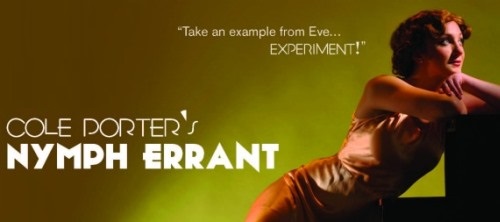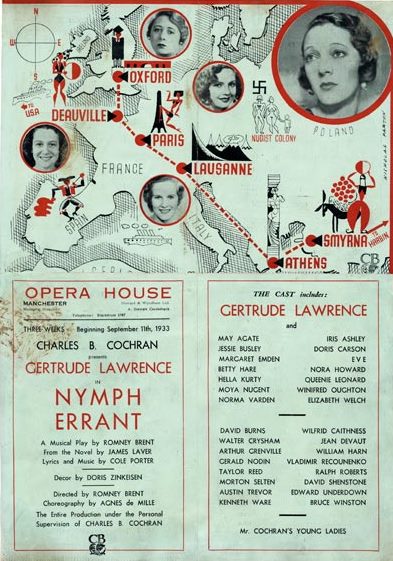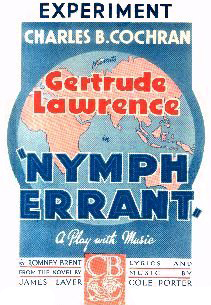Pas de biographie disponible.
Compositeur Musique additionelle Librettiste Parolier Metteur en scène Chorégraphe Producteur création Producteur version

Musical
Musique: Cole Porter • Paroles: Cole Porter • Livret: Romney Brent • Production originale: 6 versions mentionnées
Dispo: Résumé Synopsis Commentaire Génèse Liste chansons
Genèse: Cole Porter's biographers invariably list Kiss Me Kate, Anything Goes and Out of This World as his best scores, but Porter himself had one show that he always maintained was his own personal favorite: Nymph Errant. Porter’s choice is hardly known today, but in 1933 it represented the last word in “star vehicle” musical theatre writing. We presented it at Moon in 1998, and are delighted to bring it back as the opening show of our “Going Places” season. If ever a show “went places,” it’s Nymph Errantl Nymph Errant was originally a wildly successful 1932 novel by James Laver, which chronicled the adventures of a young Englishwoman named Evangeline Edwards, who makes a rather eccentric tour of the world. British producer Charles Cochran was looking for a vehicle for Gertrude Lawrence - flamboyant, outrageous, and one of Broadway and London’s brightest stars. He thought Nymph Errant was a perfect fit. Cochran quickly enlisted Cole Porter, who was coming off a string of Broadway hits including Gay Divorce, The New Yorkers and Fifty Million Frenchmen. Porter brought along his pal, raconteur/actor/director Romney Brent, to write the book and direct. The writing process proved particularly harmonious, as novelist Laver and librettist Brent joined Porter at his Paris town-house for writing sessions marked in equal measure by hard work, laughter, and champagne breaks. Following an out-of-town run in Manchester (where the title song was added), Nymph Errant debuted to one of the biggest, most glamorous opening nights London had ever seen. “Experiment,” “How Could We Be Wrong,” and “It’s Bad For Me” were hailed as Porter’s newest hit tunes, but the showstoppers that night were Lawrence’s dazzling laundry-list of body parts, “The Physician” and Elisabeth Welch’s exhilaratingly abandoned delivery of “Solomon.” Although there were some critical cavils about the extremely frank nature of the book, Gertrude Lawrence and the Porter score were met with acclaim, and the show settled in as London’s latest hit. After a few months, Lawrence’s financial and health problems (she was suffering from exhaustion) led to an early closing for Nymph. Fox Films planned, and then abandoned, a movie version, and a New York transfer never materialized. (Porter immediately followed Nymph with his biggest hit yet, Anything Goes.) Nothing more was heard from Nymph Errant until a sequence from the show was performed in the 1968 Julie Andrews biography of Lawrence, Star! The American premiere was a workshop presentation by New York’s Equity Library Theatre in 1982. London saw a major concert evening of the songs in 1987 with Lisa Kirk, Alexis Smith, Kaye Ballard, Andrea McArdle, and, amazingly, Elisabeth Welch, singing the song she had introduced 55 years earlier, “Solomon.” A new, rewritten version of Nymph Errant was performed at the Chichester Festival in England in 1999. It’s unlikely that the show will enjoy a Broadway production anytime in the near future, but the original 1933 version (which we are presenting tonight) still exists to remind us of Laver’s blithely ingenuous heroine and her amatory odyssey, Brent’s cunning wit and - of course - Porter’s supremacy at writing droll, emotional and gloriously melodic songs.
Résumé: Evangline Edwards has left her finishing school in Switzerland and, encouraged to “experiment” by the school’s chemistry mistress, Miss Pratt, decides to explore the exciting world of sex and lose her virginity before settling down in England. Her “experiments” all fail! Attempted romances include Folies Bergère producer André de Croissant who wants to make her a star; Alexei, a Russian violinist who shows her the soul of Russian music; Count Mantalini of the Holy Roman Empire; Greek businessmen Constantine; and an unfortunate incident where she gets sold into a harem, guarded by Ali. Throughout it all, she is still a virgin. In the harem she meets Haidee, a kidnapped American, and when Ben Winthrop breaks into the harem to rescue Haidee, Evangeline persuades him to rescue her instead, and they run away together to the desert. But he is more interested in plumbing than in love-making. Back in Paris, Evangeline decides to join the Folies after all - enticed by the ten handsome chorus boys in the show. But they are all gay! She gives up and ends up back in Oxford in the vicarage garden with Reverend Pither and friends. As the others go in for tea, Evangeline remain behind. Along comes the new young handsome gardener Joe. They chat awhile, get closer and closer, and finally Joe offers Evangeline an apple. As she takes a bite from the apple, the curtain falls.
Création: 6/10/1933 - Adelphi Theatre (Londres) - représ.

Version 1
Lady Comes Across (The) (1942-01-44th Street Theatre-Broadway)
Type de série: OriginalThéâtre: 44th Street Theatre (Broadway - Etats-Unis) Durée : Nombre : 3 représentationsPremière Preview : Friday 09 January 1942Première : Friday 09 January 1942Dernière : Saturday 10 January 1942Mise en scène : Romney Brent • Chorégraphie : George Balanchine • Producteur : Avec : Betty Apple (Dancing Ensemble), Mischa Auer (Ernie Bustard), Stiano Braggiotti (Alberto Zorel), Evelyn Carmel (Model), Gower Champion (Campbell), Mary Ann Crawford (Dancing Ensemble), Betty De Elmo (Dancing Ensemble), Eugenia Delarova (Ballerina Comique), Patricia Donnelly (Model), Betty Douglas (Mary), Judith Ford (Model), June Graham (Dancing Ensemble), Ronald Graham (Tony Patterson), Arline Harvey (Model), Barbara Heath (Dancing Ensemble), Phyllis Hill (Dancing Ensemble), Bettilu Ismailoff (Dancing Ensemble), Clarence Jaeger (Dancing Ensemble), Joseph Johnson (Dancing Ensemble), Hortense Kharklin (Dancing Ensemble), Lorraine Latham (Dancing Ensemble), Edith Laumer (Dancing Ensemble), Joe E. Lewis (Otis Kibber), Claire Loring (Dancing Ensemble), Marion Lulling (Dancing Ensemble), Roy Marshall (Dancing Ensemble), The Martins (4 Shoppers), Margery Moore (Dancing Ensemble), Wynn Murray (Babs Appleway), Bob Norris (Dancing Ensemble), Dorothy Partington (Model), Harry Pedersen (Dancing Ensemble), Marc Platt (The Phantom Lover), Elise Reiman (Dancing Ensemble), Lubov Rostova (Ballerina), Joan Smith (Model), Peter Kite Smith (Dancing Ensemble), Zachary Solov (Dancing Ensemble), Morton L. Stevens (Elmer James), Drucilla Strain (Model), Alcen Stuart (Dancing Ensemble), Olga Suarez (Dancing Ensemble), Dorothy Thomas (Dancing Ensemble), Jeanne Tyler (Kay), Ruth Weston (Mrs. Riverdale), Ken Whelan (Dancing Ensemble), Helen Windsor (Baroness Helstrom), Evelyn Wyckoff (Jill Charters)

Version 2
Nymph Errant (1933-09-Opera House-Manchester)
Type de série: Pre-London Try OutThéâtre: Opera House (Manchester - Angleterre) Durée : Nombre : Première Preview : InconnuPremière : Monday 11 September 1933Dernière : InconnuMise en scène : Romney Brent • Chorégraphie : Agnès de Mille • Producteur : Avec : Evangeline Edwards ... Gertrude Lawrence / Madeleine ... Iris Ashley / Henrietta Bamberg ... Doris Carson / Ben Winthrop ... Walter Crisham / André de Croissant ... Austin Trevor / Constantine ... David Burns / Haidee Robinson ... Elisabeth Welch / Clarissa Parks ... Queenie Leonard / Miss Pratt ... Moya Nugent / Dr. Roberts & Kassim ... Ralph RobertsCommentaires longs: Pre-London try-out avant création à l'Adelphi de Londres le 6 octobre 1933.
Cole Porter’s Nymph Errant opened at the Manchester Opera House in 1933 and the crowds were so huge that special police had to be drafted in to control them. The audience included Noël Coward and Douglas Fairbanks Jnr, with whom Gertrude Lawrence was having an affair at the time. The show, based on a book by James Laver, a curator at the Victoria & Albert Museum, traced the heroine’s travels around the world while trying to lose her virginity. Gertie appeared in four of the shows six long scenes and closed the show exhorting everyone to ‘Experiment’ with life. Perhaps because the episodic nature of the plot made it more of a revue than a musical, reviews of the show were cautious. But no one had any doubts about Lawrence’s performance or that of Elisabeth Welch, who stopped the show with her rendering of Solomon. Their captivating performances can still be heard on recordings made at the time.

Version 3
Nymph Errant (1933-10-Adelphi Theatre-London)
Type de série: OriginalThéâtre: Adelphi Theatre (Londres - Angleterre) Durée : 4 mois 2 semaines Nombre : 154 représentationsPremière Preview : Friday 06 October 1933Première : Friday 06 October 1933Dernière : Saturday 17 February 1934Mise en scène : Romney Brent • Chorégraphie : Agnès de Mille • Producteur : Avec : Gertrude Lawrence (Evangeline Edwards), Iris Ashley (Madeleine), Doris Carson (Henrietta Bamberg), Walter Crisham (Ben Winthrop), Austin Trevor (Andre de Croissant), David Burns (Constantine), Elisabeth Welch (Haidee Robinson), Queenie Leonard (Clarissa Parks), Moya Nugent (Miss Pratt), Ralph Roberts (Dr. Sandford, Kassim), Alexander Ivo (Alexei), Morton Selten (Count Hohenadelborn-Mantalini), Edward Underdown (Joe the gardener), Hella Kurty (Bertha), Norah Howard (Joyce Arbuthnot-Palmer), Margaret Emden (Aunt Ermyntrude), Winifred Oughton (Edith Sandford), Wilfred Caithness (Reverend Pither), May Agate (Mme. Arthur), Jean Davaut (Hercule), Jessie Busley (Mrs. Bamberg), Bruce Winston (The Eunuch), Betty Hare, Gerald Nodin, Annabel Gibson, and Kenneth Ware (Tourists)Commentaires : Pre-London try-out: à l'Opera House de Manchester à partir du 11 septembre 1933 prendant trois semaines, produit par C. B. Cochran